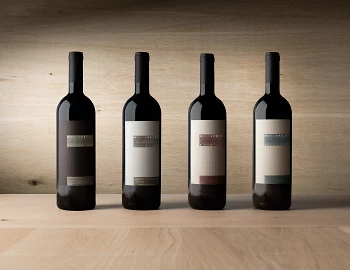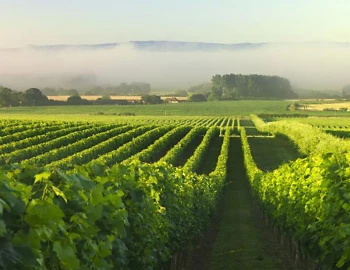Karthäuserhof
The Karthäuserhof - The cradle of world-famous Rieslings, ever since 1335.
The Karthäuserhof is a magical spot. Not just because of its idyllic location but also because it is the eighth oldest winegrowing estate in the world and for centuries the cradle of world-famous Rieslings. It was founded in 1335 by Carthusian monks who received the estate as a gift from Prince-Elector Balduin of Luxembourg and operated it as a winery until secularisation. Since 1811 the Karthäuserhof has been owned by the same family, now in the seventh generation.
The reason for the exceptional quality of the wines from the Karthäuserhof is the legendary Karthäuserhofberg vineyard at the foot of which the winery is located. Its unique "terroir" gives rise to wines of incomparable character and immense maturity potential. The Verband deutscher Prädikatsweingüter (VDP), i.e. the Association of German Quality Wine Estates, classifies the Karthäuserhofberg as a “VDP.GROSSE LAGE”, thereby designating it as one of the outstanding quality German vineyards. This classification is reserved for vineyards from which the best German wines offering complex taste, expressive vineyard character and particular maturity potential originate.
Sparkling wines from Karthäuserhof
White wines from Karthäuserhof
from Karthäuserhof
The vineyard slopes of Eitelsbach were first mentioned in a document in 1223. At their foot, the Carthusian Order founded a vineyard in 1335, which was cultivated by the monks for almost 500 years. As a result of secularisation, the Karthäuserhof fell into the hands of the French state in 1803, which auctioned it eight years later to the highest bidder, French Director General Valentin Leonardy. Since then, the Karthäuserhof has remained in the hands of the same family without interruption. The current owner Albert Behler, who manages the winery in the seventh generation, is also a descendant of the Leonardys / Rautenstrauchs / Tyrells, who have all contributed to the Karthäuserhof gaining an international reputation over the past 200 years.
Unique to every bottle of Karthäuserhof is not only the contents, but also its trademark. No other winery in the world equips its bottles exclusively with a neck label, as the Karthäuserhof has done for about 120 years. This is no coincidence: the ancestor Karl Wilhelm Rautenstrauch used the fresh spring water of the Eitelsbach, which flowed directly past his favourite garden pavilion, to cool his wines. It frequently annoyed him that the belly labels detached from the bottles and he could no longer tell which wine they contained. His solution to this problem was as simple as it was ingenious, simply apply a neck label to the bottles and, when cooling them in the stream, ensure that the top of the bottle and the neck label with its essential information protruded above water level.
The proprietary neck label bears the imposing coat of arms of the Karthäuserhof with a green monkey in the centre. The founder of the Carthusian Order, Bruno of Cologne, adopted this breed of monkey as his heraldic animal after he was called to Rome by the Pope in the 11th century. However, he did not settle there but moved on to Calabria, where he first encountered these monkeys and became fond of them. Also noteworthy on the banderole is its turquoise-golden border, which dates back to Kathinka Rautenstrauch, a descendant of the house of "4711" in Cologne and who introduced her house colours to the Karthäuserhof.
Devonian clay slate plays a decisive role in generating the terroir of the Karthäuserhof slopes. The pink-copper colour of the soil already indicates high mineral content. The very soft, warmth-retaining lamellar slate releases ferrous minerals through the effect of constant weathering. Valuable substances such as potassium, magnesium, phosphorus and numerous trace elements are absorbed by the vines and transmitted to the grapes in high concentrations. In addition to the clay slate, the soils have clayey deposits that are excellent water reservoirs. Consequently, the key supply elements are in balance: the slate stores the warmth, the clay retains the water. This fortunate symbiosis gives the wines an exceptionally broad spectrum of aromas, ranging from exotic fruits to pronounced mineral notes.
To preserve the vineyard's resources, which have developed over millions of years, and to pass on this cultural heritage intact to its descendants, the Karthäuserhof has dedicated itself to a respectful attitude towards the natural environment. In a diversity of measures, it preserves the balance between viticulture and protection of the local flora and fauna. The estate is certified with the independent seal for sustainable viticulture "Fair 'N Green".
Producer

Montepeloso
The Montepeloso winery, located in Maremma, owned by Swiss co-proprietor and estate manager Fabio Chiarelotto, has earned a reputation for outstanding red wines. With a combination of mostly traditional and indigenous grape varieties, but also international varieties such as Cabernet Sauvignon, complex wines with a Mediterranean character are produced. This Tuscan gem is hidden in the hills of Suvereto, near the Tyrrhenian coast — one of the hottest areas of Tuscany.

Massena / Jaysen Collins
Dan Standish and Jaysen Collins were college friends, and in the late 1990s they decided to put their talents together to produce wine. Recently, Jaysen Collins has taken charge of the "Massena" project on his own.The grapes are purchased from growers in Greenock, Kalimna and Koonunga Hill in the northwest Barossa Valley.

Nyetimber
For the last quarter-century, England has played a very special role in the world of wines – an exotic in moist and chilly northern Europe.












